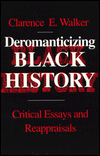

 |

|

The average rating for Deromanticizing Black history based on 2 reviews is 4 stars.
Review # 1 was written on 2012-03-29 00:00:00 Matthew McKenzie Matthew McKenzieDavid Healy shows a broad spectrum analysis of the late 19th century imperialist urge as the title suggests. The book encounters many leaders of American political thought amongst a world that was vastly changing. Americans were under the impression that the need for an imperialistic view was needed and that the United States needed to follow Great Britain in their venture for territorial investments abroad. Great Britain was a threat in the Western Hemisphere and if Americans wanted to keep Europe and the Eastern half of the world out, they would need to devise some sort of plan to achieve that goal. Healy’s book does a great job examining the different facets of American attempts at territorial gain as well as indiscriminately attains how these attempts were made and who made them. Healy breaks his book into three parts, The Setting, The Matrices, and The Issues. These three interwoven concepts show Healy’s conclusion without him actually mentioning it in the book, although he does bring out these main points abstractly in a way that is easy to comprehend. He believes first of all that American traditionalist view of two separate hemispheres was disintegrating, closely associated with the Monroe Doctrine which Healy mentions frequently, and second that the United States was becoming a world power instead of just a power in the Western Hemisphere. Both of these Healy suggests brought about incredible social, political, economic and religious change. Not necessarily domestically but all over the world. This is where his idea that the United States was becoming a world power really comes into play. The United States affects the rest of the world in the late 20th century and he set out to explain this. Healy gives in-depth looks into the lives of three little-known men in American politics during the late nineteenth century: James Harrison Wilson, Charles Denby, and Charles Conant. His account of these men’s political careers sheds new light on the economic and political manipulations these men were able to achieve for their own gain. Even though Healy shows these men and their quest for personal gain he also shows them as men who were looking to provide a better future for America and they believed they were doing just that. Healy not only examines these men but also some well-known politicians: Theodore Roosevelt, Elihu Root and William. Healy’s source material is all-encompassing for the time and the bibliography is complete with staples such as Walter Le Faber’s The New Empire: An Interpretation of American Expansion, 1860-1898 and Expansion Under New World Conditions by Josiah Strong and of course many articles, biographies and Editorials by prominent politicians of the time and historians in retrospect. Healy was writing in the late 1960s when American expansionism and foreign affairs was once again an important plank in American political thought. According to John Braeman of the University of Nebraska who wrote a review on this book, “Healy has not so much uncovered new sources as looked at familiar materials from a new perspective. In so doing, he has made a significant contribution to our understanding not only of American imperialism at the end of the nineteenth century, but of the longer-term trends in American foreign policy during the twentieth.” This surely carries over into the time period that he lives in and for many generations to come. He has provided an important addition to literature on American Imperialism and gives a unique look into the politics of the time and how it influenced the twentieth century. |
Review # 2 was written on 2012-03-29 00:00:00 Paul L. Boyko Paul L. BoykoVery valuable resourse for my studies on Loyalists. This segment of the large Loyalist migration is perhaps under recognized, especially by those of us not from the maritimes. The experiance of the black Loyalist was, in my opinion, harsher and more extreme, than those faced by their white counterparts. Excellent for research, good for lovers of Canadian history. |
CAN'T FIND WHAT YOU'RE LOOKING FOR? CLICK HERE!!!